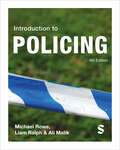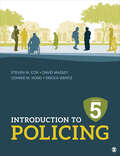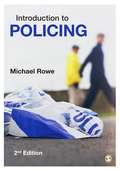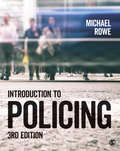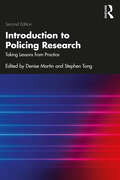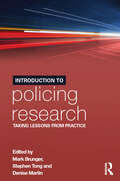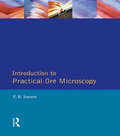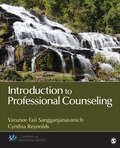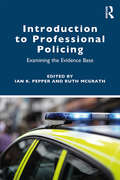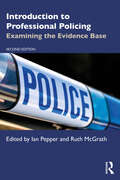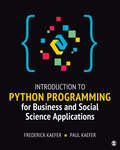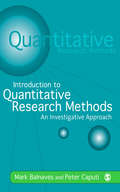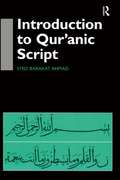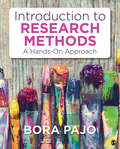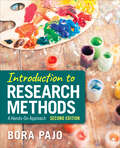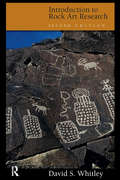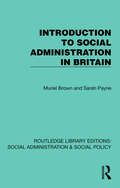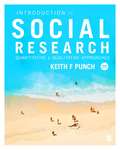- Table View
- List View
Introduction to Policing
by Michael Rowe Liam Ralph Ali Malik"An extremely valuable source of reading, information, and guidance for my policing students. It covers all the topical issues." Johannes Oosthuizen – Lecturer at Winchester University Introducing the definitive guide for students and professionals alike who want to gain a comprehensive understanding of policing in the 21st century. This updated edition of Introduction to Policing reflects the latest developments in policing and offers a rigorous yet accessible overview of the historical origins and theories of policing, the functions of police organisations, and the challenges and controversies facing policing today. With an emphasis on critical thinking and analysis, Rowe encourages readers to consider different perspectives and to engage with key debates around policing, such as ‘who guards the guards’ and ‘the implications of police culture’, helping them to develop a more nuanced understanding of this complex field. The clear writing style, engaging case studies, and helpful study aids make this book an invaluable resource for students and professionals alike. Key features include: • Revised and expanded discussion of racism and police culture, and new coverage of the development of antiracist policing • Updated examples reflecting contemporary criticisms of policing, such as the cases of Sarah Everard and George Floyd • Expanded discussion of key debates, including the ‘defund the police’ movement, and the use of technology and digital policing, including Smart Policing, drones, and body-worn cameras • Learning objectives, key terms, review questions, and annotated further readings in every chapter will help you to engage with the material and consolidate your learning Michael Rowe is Professor of Criminology at Northumbria University Liam Ralph is Assistant Professor of Criminology at Northumbria University Ali Malik is Lecturer in Criminal Justice at University of Leeds
Introduction to Policing
by Michael Rowe Liam Ralph Ali Malik"An extremely valuable source of reading, information, and guidance for my policing students. It covers all the topical issues." Johannes Oosthuizen – Lecturer at Winchester University Introducing the definitive guide for students and professionals alike who want to gain a comprehensive understanding of policing in the 21st century. This updated edition of Introduction to Policing reflects the latest developments in policing and offers a rigorous yet accessible overview of the historical origins and theories of policing, the functions of police organisations, and the challenges and controversies facing policing today. With an emphasis on critical thinking and analysis, Rowe encourages readers to consider different perspectives and to engage with key debates around policing, such as ‘who guards the guards’ and ‘the implications of police culture’, helping them to develop a more nuanced understanding of this complex field. The clear writing style, engaging case studies, and helpful study aids make this book an invaluable resource for students and professionals alike. Key features include: • Revised and expanded discussion of racism and police culture, and new coverage of the development of antiracist policing • Updated examples reflecting contemporary criticisms of policing, such as the cases of Sarah Everard and George Floyd • Expanded discussion of key debates, including the ‘defund the police’ movement, and the use of technology and digital policing, including Smart Policing, drones, and body-worn cameras • Learning objectives, key terms, review questions, and annotated further readings in every chapter will help you to engage with the material and consolidate your learning Michael Rowe is Professor of Criminology at Northumbria University Liam Ralph is Assistant Professor of Criminology at Northumbria University Ali Malik is Lecturer in Criminal Justice at University of Leeds
Introduction to Policing
by Steven M. Cox David W. Massey Connie M. Koski Ericka WentzWritten by an author team that includes former and current law enforcement officers, Introduction to Policing focuses on the most thought-provoking, contemporary issues in the world of policing. The authors tackle complex issues that impact policing today, such as social diversity; advancements in technology; and global issues, such as terrorism and transnational organized crime. The Fifth Edition offers fully updated content in SAGE’s Vantage courseware platform. This title is accompanied by a complete teaching and learning package. Contact your SAGE representative to request a demo. Learning Platform / Courseware SAGE Vantage is an intuitive learning platform that integrates quality SAGE textbook content with assignable multimedia activities and auto-graded assessments to drive student engagement and ensure accountability. Unparalleled in its ease of use and built for dynamic teaching and learning, Vantage offers customizable LMS integration and best-in-class support. It’s a learning platform you and your students will actually love. Learn more. Assignable Video with Assessment Assignable video (available in SAGE Vantage) is tied to learning objectives and curated exclusively for this text to bring concepts to life. Watch a sample video now. LMS Cartridge: Import this title’s instructor resources into your school’s learning management system (LMS) and save time. Don’t use an LMS? You can still access all of the same online resources for this title via the password-protected Instructor Resource Site. Learn more.
Introduction to Policing
by Steven M. Cox David W. Massey Connie M. Koski Ericka WentzWritten by an author team that includes former and current law enforcement officers, Introduction to Policing focuses on the most thought-provoking, contemporary issues in the world of policing. The authors tackle complex issues that impact policing today, such as social diversity; advancements in technology; and global issues, such as terrorism and transnational organized crime. The Fifth Edition offers fully updated content in SAGE’s Vantage courseware platform. This title is accompanied by a complete teaching and learning package. Contact your SAGE representative to request a demo. Learning Platform / Courseware SAGE Vantage is an intuitive learning platform that integrates quality SAGE textbook content with assignable multimedia activities and auto-graded assessments to drive student engagement and ensure accountability. Unparalleled in its ease of use and built for dynamic teaching and learning, Vantage offers customizable LMS integration and best-in-class support. It’s a learning platform you and your students will actually love. Learn more. Assignable Video with Assessment Assignable video (available in SAGE Vantage) is tied to learning objectives and curated exclusively for this text to bring concepts to life. Watch a sample video now. LMS Cartridge: Import this title’s instructor resources into your school’s learning management system (LMS) and save time. Don’t use an LMS? You can still access all of the same online resources for this title via the password-protected Instructor Resource Site. Learn more.
Introduction to Policing
by Michael RoweThoroughly updated to take account of recent changes in policy, this book covers everything you need to excel at your studies in Policing. It includes: A new chapter on Global and Transnational Policing rich in comparative examples A new chapter on Criminal Investigation, providing a complete overview of the criminal investigation process A concluding chapter tying together the book's themes, including a new section on approaches to policing A companion website with lecturer resources, web links, expanded case studies and links to relevant journal articles Written with flair and enthusiasm, the text is packed with helpful learning features from key terms, learning objectives and chapter summaries, to self-check questions, annotated further reading, text boxes and a glossary.
Introduction to Policing
by Michael Rowe'Introduction to Policing is the "go to" text on the topic for readers keen to understand past, current and future trends in policing in England and Wales. Accessible to read yet academic in content, the text provides an excellent starting point for any reader no matter what level of previous knowledge they may possess.' John Lamb, Lecturer at Birmingham City University Delving into the real issues of policing, and fully updated to cover recent changes in the field, the acclaimed Introduction to Policing, Third Edition is the introduction to your Police Studies course. As well as providing students with an account of the history of the police, Michael Rowe addresses the most current topics and provides all the tools needed to successfully take a critical view of policing. The third edition includes: Significant discussion of Police and Crime Commissioners, the impact of austerity, and ways in which technology will continue to shape policing in the 21st century An updated accompanying website with web links, expanded case studies and links to free journal articles Helpful learning features including key terms, learning objectives, summaries, self-check questions, annotated further reading and a glossary
Introduction to Policing
by Michael Rowe'Introduction to Policing is the "go to" text on the topic for readers keen to understand past, current and future trends in policing in England and Wales. Accessible to read yet academic in content, the text provides an excellent starting point for any reader no matter what level of previous knowledge they may possess.' John Lamb, Lecturer at Birmingham City University Delving into the real issues of policing, and fully updated to cover recent changes in the field, the acclaimed Introduction to Policing, Third Edition is the introduction to your Police Studies course. As well as providing students with an account of the history of the police, Michael Rowe addresses the most current topics and provides all the tools needed to successfully take a critical view of policing. The third edition includes: Significant discussion of Police and Crime Commissioners, the impact of austerity, and ways in which technology will continue to shape policing in the 21st century An updated accompanying website with web links, expanded case studies and links to free journal articles Helpful learning features including key terms, learning objectives, summaries, self-check questions, annotated further reading and a glossary
Introduction to Policing Research: Taking Lessons from Practice
by Stephen Tong Denise MartinThis book offers a first-hand insight into the work of policing scholars and the research that they undertake. Bringing together a range of leading scholars and drawing on a range of pressing topics, it introduces the diverse nature of policing research, and the ethical and practical challenges faced by policing researchers. Each chapter brings clarity to the concept of empirical research within policing, introduces readers to the theoretical explanations and assumptions that underpin the rational of research design in policing, as well as considering the limitations of research. Topics include: • research methods in police research; • police professionalisation; • police and diversity; • police leadership; • undercover policing; • police and vulnerability; • activist research; • social media and policing. This revised and expanded new edition includes more focus on the role of research in policing, police and academic partnerships and practitioners as researchers, as well as a brand new section offering international perspectives on policing research. Brimming with practical examples, case studies, key learning points and practical advice, this book is essential reading for Professional Policing students, as well as early-career researchers and those engaged with criminological research methods.
Introduction to Policing Research: Taking Lessons from Practice
by Mark Brunger, Stephen Tong and Denise MartinThe expansion of degrees and postgraduate qualifications on policing has come hand in hand with the need for a more scholarly and research-based approach to the subject. Students are increasingly encouraged to apply research to practice and this book is specifically designed to bring clarity to the concept of empirical research in policing.As an introduction to the theoretical explanations and assumptions that underpin the rationale of research design in policing, this book clearly illustrates the practical and ethical issues facing empirical research in a policing context, as well as the limitations of such research. Introduction to Policing Research brings together a range of leading scholars who have a wide range of experience conducting police research. Topics covered include: professional development, police culture, policing protests, private policing, policing and diversity, policing in transition, policing and mental health, policing and sensitive issues. This book is perfect for undergraduate and graduate students on policing degrees, as well as graduate students and researchers engaged with criminal justice. It is also essential reading for police officers taking professional and academic qualifications.
Introduction to Practical Ore Microscopy (Longman Earth Science Series)
by P.R. InesonFirst published in 1989. This book is designed to be an introduction to Ore microscopy, which is the traditional name for the study of opaque minerals using a polarising ‘incident light’ microscope. It is also known as reflected light microscopy. It has applications in the fields of mineralogy, economic geology, mineral dressing, metallurgy and in the study of igneous, metamorphic and sedimentary rocks which contain opaque minerals. Although mineral identification is an important aspect of the study of the opaque ores, an examination of the textures and structures is also valuable.
Introduction to Professional Counseling (Counseling and Professional Identity)
by Dr Varunee Faii Sangganjanavanich Dr Cynthia A. ReynoldsOrganized around the latest CACREP standards, Introduction to Professional Counseling integrates key theoretical concepts with discussion of the practical aspects of the field. Drawing from their own experiences as counseling practitioners, editors Varunee Faii Sangganjanavanich and Cynthia A. Reynolds explore what it means to develop a professional counseling identity, emphasizing the importance of intentionality and reflection in practice. Numerous case studies and practice exercises in this innovative text further personalize the content for developing 21st century counselors. Introduction to Professional Counseling is part of the Counseling and Professional Identity Series, which targets specific competencies identified by CACREP (Council for Accreditation of Counseling and Related Programs).
Introduction to Professional Counseling (Counseling and Professional Identity)
by Dr Varunee Faii Sangganjanavanich Dr Cynthia A. ReynoldsOrganized around the latest CACREP standards, Introduction to Professional Counseling integrates key theoretical concepts with discussion of the practical aspects of the field. Drawing from their own experiences as counseling practitioners, editors Varunee Faii Sangganjanavanich and Cynthia A. Reynolds explore what it means to develop a professional counseling identity, emphasizing the importance of intentionality and reflection in practice. Numerous case studies and practice exercises in this innovative text further personalize the content for developing 21st century counselors. Introduction to Professional Counseling is part of the Counseling and Professional Identity Series, which targets specific competencies identified by CACREP (Council for Accreditation of Counseling and Related Programs).
Introduction to Professional Policing: Examining the Evidence Base
by Ian K. Pepper Ruth McGrathPolicing is a dynamic profession with increasing demands and complexities placed upon the police officers and staff who provide a 24-hour service across a diverse range of communities. Written by experts in police higher education from across both academic and professional practice, this book equips aspiring or newly appointed police constables with the knowledge and understanding to deal with the significant and often complex challenges they face daily. Introduction to Professional Policing explores a selected number of the core underpinning knowledge requirements identified as themes within the evolving National Policing Curriculum (NPC) and Police Education Qualifications Framework (PEQF). These include: The evolution of criminal justice as a discipline Exploration of operational duties The ethics of professional policing Victims and protection of the vulnerable Crime prevention and approaches to counter-terrorism Digital policing and data protection Evidence based decision making Police leadership At the end of each chapter the student finds a case study, reflective questions and a further reading list, all of which reinforces students’ knowledge and furthers their professional development. Written in a clear and direct style, this book supports aspiring police constables, newly appointed police constables or direct entry (DE) detectives, as well as those interested in learning more about policing. It is essential reading for students taking a degree in Professional Policing.
Introduction to Professional Policing: Examining the Evidence Base
by Ian PepperPolicing is a dynamic profession with increasing demands and complexities placed upon police officers, staff and volunteers who provide a 24-hour service across a diverse range of communities. Written by experts in policing higher education from across both academic and professional practice, this book equips aspiring or newly appointed police officers, staff and volunteers with the knowledge and understanding to deal with the significant and often complex challenges they face daily.This second edition of Introduction to Professional Policing explores a number of the core underpinning knowledge requirements identified as themes within the ever-evolving National Policing Curriculum (NPC) and Police Constable Entry Routes (PCER), while also informing those embarking on leadership development. These include: Community and neighbourhood policing Counter-terrorism Digital policing Ethics, equality, diversity and inclusion Evidence-based policing Maintaining professional standards Police leadership Problem solving and problem-oriented policing Victims and protecting the vulnerable Volunteers in policing This edition has been reviewed and significantly updated in line with the dynamic and ongoing demands faced by operational policing and therefore the associated knowledge requirements for policing education and training. The book is refocused on the learning requirements contained within the range of entry routes now available in to policing, as well as the professional development of those serving as police staff and volunteers. This includes new chapters providing insights into community and neighbourhood policing, problem solving and volunteers in policing.At the end of each chapter the student finds a case study, reflective questions and an extensive reference list, all of which reinforces students’ knowledge and furthers their professional development. Written in a clear and direct style, this book supports aspiring police officers, newly appointed police officers, direct entry detectives, community support officers, special constables and police staff. It will also be of interest to those embarking on a leadership journey within policing and anyone wanting to learn more about the profession of policing. It is essential reading for students taking a professional policing degree or commencing any of the police constable entry routes.
Introduction to Python Programming for Business and Social Science Applications
by Paul Kaefer Frederick KaeferWould you like to gather big datasets, analyze them, and visualize the results, all in one program? If this describes you, then Introduction to Python Programming for Business and Social Science Applications is the book for you. Authors Frederick Kaefer and Paul Kaefer walk you through each step of the Python package installation and analysis process, with frequent exercises throughout so you can immediately try out the functions you’ve learned. Written in straightforward language for those with no programming background, this book will teach you how to use Python for your research and data analysis. Instead of teaching you the principles and practices of programming as a whole, this application-oriented text focuses on only what you need to know to research and answer social science questions. The text features two types of examples, one set from the General Social Survey and one set from a large taxi trip dataset from a major metropolitan area, to help readers understand the possibilities of working with Python. Chapters on installing and working within a programming environment, basic skills, and necessary commands will get you up and running quickly, while chapters on programming logic, data input and output, and data frames help you establish the basic framework for conducting analyses. Further chapters on web scraping, statistical analysis, machine learning, and data visualization help you apply your skills to your research. More advanced information on developing graphical user interfaces (GUIs) help you create functional data products using Python to inform general users of data who don’t work within Python. First there was IBM® SPSS®, then there was R, and now there′s Python. Statistical software is getting more aggressive - let authors Frederick Kaefer and Paul Kaefer help you tame it with Introduction to Python Programming for Business and Social Science Applications.
Introduction to Python Programming for Business and Social Science Applications
by Paul Kaefer Frederick KaeferWould you like to gather big datasets, analyze them, and visualize the results, all in one program? If this describes you, then Introduction to Python Programming for Business and Social Science Applications is the book for you. Authors Frederick Kaefer and Paul Kaefer walk you through each step of the Python package installation and analysis process, with frequent exercises throughout so you can immediately try out the functions you’ve learned. Written in straightforward language for those with no programming background, this book will teach you how to use Python for your research and data analysis. Instead of teaching you the principles and practices of programming as a whole, this application-oriented text focuses on only what you need to know to research and answer social science questions. The text features two types of examples, one set from the General Social Survey and one set from a large taxi trip dataset from a major metropolitan area, to help readers understand the possibilities of working with Python. Chapters on installing and working within a programming environment, basic skills, and necessary commands will get you up and running quickly, while chapters on programming logic, data input and output, and data frames help you establish the basic framework for conducting analyses. Further chapters on web scraping, statistical analysis, machine learning, and data visualization help you apply your skills to your research. More advanced information on developing graphical user interfaces (GUIs) help you create functional data products using Python to inform general users of data who don’t work within Python. First there was IBM® SPSS®, then there was R, and now there′s Python. Statistical software is getting more aggressive - let authors Frederick Kaefer and Paul Kaefer help you tame it with Introduction to Python Programming for Business and Social Science Applications.
Introduction to Quantitative Research Methods: An Investigative Approach
by Peter Caputi Mark BalnavesIntroduction to Quantitative Research Methods is a student-friendly introduction to quantitative research methods and basic statistics. It uses a detective theme throughout the text to show how quantitative methods have been used to solve real-life problems. The book focuses on principles and techniques that are appropriate to introductory level courses in media, psychology and sociology. Examples and illustrations are drawn from historical and contemporary research in the social sciences. The original CD-ROM accompanying the book and its content are no longer available.
Introduction to Qur'anic Script
by Syed Barakat Ahmad'Masterly work ... Leads the reader patiently but directly not merely into Qur'anic writing but into the heart of that Holy Book itself ... By the time we have followed Dr Ahmad to the end of this splendid work we have learned something new and indeed something uplifting about one of the world's great books.' Prof. F. E. Peters, New York University.
Introduction to Research Methods: A Hands-On Approach
by Bora PajoIntroduction to Research Methods: A Hands-On Approach makes learning research methods easy for students by giving them activities they can experience and do on their own. With clear, simple, and even humorous prose, this text offers students a straightforward introduction to an exciting new world of social science and behavioral research. Rather than making research seem intimidating, author Bora Pajo shows students how research can be an easy, ongoing conversation on topics that matter in their lives. Each chapter includes real research examples that illustrate specific topics that the chapter covers, guides that help students explore actual research challenges in more depth, and ethical considerations relating to specific chapter topics. 3 Reasons Why You’ll Want to Read This Book 1. Conducting research can be fun when you see it in terms that relate to your everyday life. 2. Knowing how to do research will open many doors for you in your career. It will open your mind to new ideas on what you might pursue in the future (e.g., becoming an entrepreneur, opening your own nongovernmental organization, or running your own health clinic), and give you an extra analytic skill to brag about in your job interviews. 3. Understanding research will make you an educated consumer. You will be able to evaluate the information before you and determine what to accept and what to reject. Truth be told, understanding research will save you money in the short and long term*. *From Chapter 1 of Introduction to Research Methods: A Hands-On Approach
Introduction to Research Methods: A Hands-On Approach
by Bora PajoIntroduction to Research Methods: A Hands-On Approach makes learning research methods easy for students by giving them activities they can experience and do on their own. With clear, simple, and even humorous prose, this text offers students a straightforward introduction to an exciting new world of social science and behavioral research. Rather than making research seem intimidating, author Bora Pajo shows students how research can be an easy, ongoing conversation on topics that matter in their lives. Each chapter includes real research examples that illustrate specific topics that the chapter covers, guides that help students explore actual research challenges in more depth, and ethical considerations relating to specific chapter topics. 3 Reasons Why You’ll Want to Read This Book 1. Conducting research can be fun when you see it in terms that relate to your everyday life. 2. Knowing how to do research will open many doors for you in your career. It will open your mind to new ideas on what you might pursue in the future (e.g., becoming an entrepreneur, opening your own nongovernmental organization, or running your own health clinic), and give you an extra analytic skill to brag about in your job interviews. 3. Understanding research will make you an educated consumer. You will be able to evaluate the information before you and determine what to accept and what to reject. Truth be told, understanding research will save you money in the short and long term*. *From Chapter 1 of Introduction to Research Methods: A Hands-On Approach
Introduction to Research Methods: A Hands-on Approach
by Bora PajoThe Second Edition of Introduction to Research Methods: A Hands-On Approach by Bora Pajo continues to make research easy to understand and easy to construct. Covering both quantitative and qualitative methods, this new edition lays out the differences between research approaches so readers can better understand when and how to use each research design. Through clear, simple, and even humorous prose, this text offers students a straightforward introduction to a new world of social science research. Rather than making research seem intimidating, Introduction to Research Methods shows students that research is an ongoing conversation concerning topics that matter in their lives, a conversation that′s easy to understand and easy to join. The new edition features updated chapters on qualitative designs and qualitative data analysis, a new chapter on big data and digital methods, and updated citation and report styles for APA Style 7th Edition. This title is accompanied by a complete teaching and learning package in SAGE Vantage, an intuitive learning platform that integrates quality SAGE textbook content with assignable multimedia activities and auto-graded assessments to drive student engagement and ensure accountability. Unparalleled in its ease of use and built for dynamic teaching and learning, Vantage offers customizable LMS integration and best-in-class support.
Introduction to Research Methods: A Hands-on Approach
by Bora PajoThe Second Edition of Introduction to Research Methods: A Hands-On Approach by Bora Pajo continues to make research easy to understand and easy to construct. Covering both quantitative and qualitative methods, this new edition lays out the differences between research approaches so readers can better understand when and how to use each research design. Through clear, simple, and even humorous prose, this text offers students a straightforward introduction to a new world of social science research. Rather than making research seem intimidating, Introduction to Research Methods shows students that research is an ongoing conversation concerning topics that matter in their lives, a conversation that′s easy to understand and easy to join. The new edition features updated chapters on qualitative designs and qualitative data analysis, a new chapter on big data and digital methods, and updated citation and report styles for APA Style 7th Edition. This title is accompanied by a complete teaching and learning package in SAGE Vantage, an intuitive learning platform that integrates quality SAGE textbook content with assignable multimedia activities and auto-graded assessments to drive student engagement and ensure accountability. Unparalleled in its ease of use and built for dynamic teaching and learning, Vantage offers customizable LMS integration and best-in-class support.
Introduction to Rock Art Research
by David WhitleyFirst published in 2005, this brief introduction to methods of studying rock art has become the standard text for courses on this topic. It was also selected as a Choice Magazine Outstanding Academic Book in 2005. Internationally-known rock art researcher David Whitley takes the reader through the various processes needed to document, interpret, and preserve this fragile category of artifact. Using examples from around the globe, he offers a comprehensive guide to rock art studies of value to archaeologists and art historians, their students, and rock art aficionados. The second edition of this classic work has additional material on mapping sites, ethnographic analogy, neuropsychological models, and Native American consultation.
Introduction to Social Administration in Britain (Routledge Library Editions: Social Administration & Social Policy)
by Sarah Payne Muriel BrownPublished in 1994, as a revised and updated seventh edition, this classic guide to social administration was first published in 1969. The book provides information about social problems and the structure and working of the social services in the late 20th Century. It also identifies the main lines of development in social legislation and clarifies the issues that dominated social policy, many of which are still relevant today. Major changes to provision in social security, health, education, employment and personal social services have been incorporated and the conflicts around these changes explored. The trend towards the privatization of welfare and the centralizing role of the state are discussed in the context of economic change. This text will be of interest to students, lecturers and professionals in the history of social policy, sociology, policy-making.
Introduction to Social Research: Quantitative and Qualitative Approaches (Essential Resource Books For Social Research Ser.)
by Dr Keith F PunchIn the new edition of Introduction to Social Research, Keith Punch takes a fresh look at the entire research process, from formulating a research question to writing up your research. Covering qualitative, quantitative and mixed methods, the book focuses on matching research questions to appropriate methods. Offering concise, balanced coverage, this book clearly explains the underlying principles of social research and shows you how to put this understanding into practice. The third edition includes: A new chapter on literature searching and reviewing Expanded coverage of ethics A new section on using the internet in research A range of additional student learning features A brand new companion website including full-text journal articles, additional case studies and video tutorials. Using a range of examples from student research and published work, the book is an ideal introduction for any social science student taking a research methods course or embarking on their own undergraduate or postgraduate research project.
